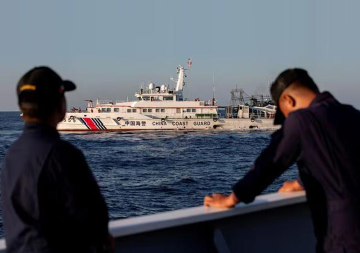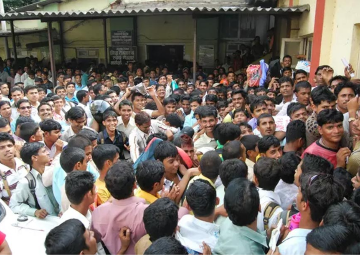Introduction
Sri Lanka’s southern port city, Hambantota, has been in ferment since Prime Minister Ranil Wickremesinghe, accompanied by Chinese Ambassador, Yi Xianliang, inaugurated the industrial zone in January 2017. Angry protestors clashed with the police, demanding that their ancestral land not be given away to the Chinese state-run China Merchants Port Holding Company to whom the port has been leased, for US$ 1.2 billion, for a period of 99 years.
Though the government has made extensions on the deal’s timeline, the residents are angry that they might inevitably lose their land. Even as the communities are organising protest actions, it now seems unlikely that the Sri Lankan government will rescind the deal, concerned as it is with repaying the large debt taken by the earlier Mahinda Rajapaksa government.
Local Communities Outraged
In early September this author met Chandima Damayanthi, a resident of Hambantota, who is among those who will be directly affected by the port. She vowed to put up a fight against the government’s plan to resettle her family to facilitate the transfer of land to the Hambantota Port and Industrial Zone. With this author, she organised a meeting of farmers, teachers, and elders, who all expressed outrage over what they see as a threat not only to their livelihood, but the very kinship of their village life. They were initially told to leave their village, Manjjawa, by 15 September; that deadline has since been moved. Looking around their well-furnished house, one could not find any clue that Damayanthi or her family was going anywhere. “We will fight to the death to save our ancestral property. Let’s see how the administration gives our land to the Chinese,” said Kusumsiri, an English teacher in the village school.
The decision of the Sri Lanka Freedom Party (SLFP) and United National Party (UNP) coalition government to give the Hambantota Port—which sits strategically as it juts out into the Indian Ocean—on a 99-year lease to a Chinese company has thrown into a vortex of uncertainty the lives of the villagers. These villagers now stand at the forefront of a growing opposition to the government. Since the decision was taken by the government to lease the Hambantota Port to a Chinese company, the Minister of Justice, Wijeyadasa Rajapakshe, has been sacked for opposing the deal and another minister looking after ports, Arjuna Ranatunga, has been shifted to an innocuous job for doing the same. Ranatunga had warned that the project “could undermine national sovereignty”.
Indeed, this decision by President Maithripala Sirisena has proved highly unpopular, and threatens to cause instability in a country that had only recently witnessed normalcy. President Sirisena himself was instrumental in that return to normalcy, after a period of chaos following the voting out of President Mahinda Rajapaksa in 2015. Sirisena had promised his people ‘Yahapalayanaya’ (Good Governance).
It is not only politicians who have latched on to the issue of the port. The Buddhist Maha Nikayas, who have great influence in the island’s politics, are also opposing the grant of land to the Chinese company. The Supreme Patriarch of the second-most important Maha Nikaya (Amarapura), 92-year-old Venerable Kotugoda Dhammawasa Thera, who has millions of supporters and Bhikkhus (male monks), told this writer, “We reject the deal.” When Prime Minister Ranil Wickremesinghe visited Hambantota to inaugurate the port with the Chinese Ambassador in January this year, Buddhist monks greeted them with a protest action.
Questions on the Port Deals
The crucial question is why the coalition government of the SLFP and UNP— which came to power in 2015 promising to stop corrupt deals allegedly transacted by the previous government in the Colombo Port City Project and Hambantota—ended up clearing the same deals with China on terms that are hurting its credibility. Due to the opaque nature of the agreement there is plenty of speculation across Colombo about why the present government had cleared the deals arranged under Rajapaksa. There are allegations of corruption, and a suggestion that it might have been impossible to get out of the agreement lest it provoked the ire of China. What is also true is that the circumstances that pushed Rajapaksa to take hefty loans from China have remained under the new government.
After 2009, no country wanted to make investments in Sri Lanka because of Rajapaksa, who had by then become an international pariah after the manner in which the Tamil Tigers challenge was brutally extinguished. China, along with Pakistan, had supplied arms and provided support to fight the conflict. Beijing also offered loans for reconstruction, which the controversial president sought to leverage to consolidate support amongst the masses.
Rajapaksa used these loans from China to build the road network and infrastructure in Hambantota, which happens to be his constituency. The loans that he took to build these infrastructure projects, including Colombo Port City, totalled around US$ 8 billion. There were fears then that the government may find it difficult to repay these loans, procured at rates even higher than prevailing commercial rates, and that the country was simply walking into a debt trap. At the same time, the Chinese companies also did not ask tough questions, like many lenders do, about Colombo’s ability to pay. This is the reason why critics of the deal, such as ousted minister Rajapakshe, claim that the intentions of the Chinese were less than honourable.
After the SLFP-UNP alliance came to power, deals with the Chinese were immediately put on hold, as they were perceived as symbols of corruption, authoritarianism, and misplaced priorities for development. These misgivings were expressed regarding Hambantota Port and Colombo Port City, the latter being described as a mirror image of Dubai’s Palm Springs with its high-end apartments, malls, and other facilities that only the wealthy can afford.
The Hambantota Project, like Colombo Port City, also promised ownership of the land to the Chinese. Rajapaksa’s critics had then claimed that he was turning the island into “a Chinese colony”. Those allegations, interestingly, have resurfaced after Sri Lanka was compelled to renegotiate the Hambantota Port deal. As the Sirisena government stared at the ballooning debt, which was a result of the profligacy of the earlier government, it was compelled to renegotiate the Hambantota Port deal by turning debt into equity and leasing it out for a period of 99 years. Colombo, it seems, did not have much of an option to ward off the Chinese when contractors of the Southern Port, China Communication and Construction Co. Ltd, demanded US$ 143 million as compensation for stopping work. The Sirisena government was forced to walk the thin line between saving the country from default and pursuing development with little resources.
Sri Lanka, whose economic growth faltered in 2016 at 3.5 percent, was not in a position to repay the loans taken when its growth was at a high 6.4 percent. There were other issues that prevented the Sri Lankans from going for open tendering or getting other investors.
President Sirisena, in his speeches to members of his party, had claimed that the real reason why Rajapaksa had called for elections two years before schedule was that he knew that the repayment of the loans would start in 2017 and then he would not know how to manage the issue.[i] As he was riding on the crest of his popularity after defeating the Tamil Tigers, he thought a fresh mandate would allow him to deal with any criticism that may be directed at him for taking such drastic decisions. What this point of view suggested is the inevitability of the sale of land and turning of debt into equity and the subsequent institutional imprimatur on China’s enlargement of influence in Sri Lanka. To put it simply, China’s growing control over some key Sri Lankan assets was scripted in the decision taken by Mahinda Rajapaksa a few years ago.
The ‘Next Djibouti’?
The deal involves China paying US$ 1.12 billion in a debt-equity swap in the ratio of 70:30. The China Merchant Port Holdings Company (CMPort) gets 69.55 percent of the shares and the Sri Lanka Port Authority (SLPA), a public sector organisation, holds 30.45 percent. After 10 years, SLPA will have the option to buy another 20 percent of the shares, making the two companies equal partners. These are some of the clauses that have been introduced by the new government to make the deal more acceptable. Ranatunga told Hardnews, a Delhi-based magazine, that the original agreement prepared by the committee of secretaries, which was later changed, was loaded in favour of the Chinese. The deal cleared by the Sri Lanka government also takes into cognisance the security concerns of countries such as India. Now, the Sri Lanka Navy and Police will handle the security of the port, which will be used only for commercial purposes. Does that satisfy Indians? In the words of a diplomat who spoke to this writer, “To clear the deal, the Chinese may have agreed to these changes, but make no mistake that this will be the next Djibouti – which is now China’s military base in Africa.”
Smruti Pattanaik of the Institute of Defence and Strategic Analyses writes: “The agreement envisages the formation of 2 special vehicle companies – the Hambantota International Port Services Company (HIPS) to provide port services and security, and the Hambantota International Port Group Company (HIPG) to look after the commercial aspects. In HIPS, the SLPA will hold 50.7 percent of the shares, and CMPort will get 49.3 percent. And in HIPG, CMPort will own 85 per cent of the shares and SLPA 15 per cent. The agreement leases out the port to CMPort for 99 years.”[ii]
Questions have been raised on the 99-year lease not only by ministers in the government, but also by former President Rajapaksa and his extremely influential brother, Basil. Basil told Hardnews that their government had not bartered away the country’s sovereignty like this government has done. He claimed that the land belonged to the people of Sri Lanka and there was no way it could be acquired. If they came to power they will scrap the deal, he said. Coming from the Rajapaksas, the statement is quite rich.
To buttress their claim further as the champions of national sovereignty that opposes grant of land to any country, the Rajapaksas[iii] have mounted an agitation against the government’s proposal to hand over the grossly underutilised Hambantota airport to India. Rajapaksa’s son, Namal, led a protest action at the Indian Consulate and forcibly tried to enter its premises. The police stopped their bid, but it was clear that the Rajapaksas can sense a serious revival due to the instability in the ruling coalition caused by regional power contestation. This is despite the fact that life for the media and civil society has improved under the present regime. The control over the press has loosened, enabling it to operate with more freedom than it has ever experienced before. Indeed, these days, it is unsurprising to see members of the media attacking the government and, quite ironically, backing the Rajapaksas that had muzzled them when they were in power.
Mahinda Rajapaksa and his brood are probably counting on the possibility that the Sri Lankan people have forgotten his role in pushing the country into a massive debt trap. He has found the resentment towards the Chinese deal to attract dissident MPs and those who think that they cannot win on the ticket of the ruling coalition are beginning to make new adjustments. “The difference between the winners and losers was only 400,000 votes in the Parliamentary Elections and going by the mood in the country, more than a million votes may have crossed over to Rajapaksa and his new party,” said a power broker.
Basil, who is busy putting the new party together to fight the elections – provincial to begin with – is confident that the wind is blowing in their direction. However, political commentators scoff at his assertions. They are convinced that a change at the top echelons is not possible before President Sirisena’s term comes to an end. Meanwhile, Colombo is abuzz with talk about the possible permutations that may play out when the elections finally take place. Rajapaksa cannot become president again as he has completed his two terms. However, there is nothing that can stop him from becoming prime minister if his party becomes part of a ruling alliance. There are suggestions that the sacked minister, Wijeyadasa Rajapakshe, who built a strong support amongst Sinhala nationalists and the Buddhist clergy after opposing the Hambantota deal, could be backed as a candidate by Rajapaksa’s party (the two are not related). Basil thinks it is quite possible, especially going by the number of political parties that are supporting their fledgling party, whose insignia is a bud.
As the Hambantota deal redefines politics in Colombo, the villagers are bracing for the next developments. They have learned unofficially that not only Manjjawa, but Medilla, Gajabapura, Dehemipura, Tsunami Gammanaya, and a few more villages will be acquired soon.
Cultural Friction
Lazily reclining in his well-appointed residence, the Deputy Mayor of Hambantota, U.K. Dissanayake, pointed at the map and drew an imaginary line with his finger, saying that all this area will be vacated for the Chinese company. “We want to know what kind of companies will come here. We do not want industries that cause pollution to come to the industrial zone and destroy our water and air,”[iv] he said. Dissanayake pointed out that the Chinese who are living in Hambantota have no respect for their culture. “The other day a Chinese man hugged a local girl in the market,” he said. The enraged girl and her family had to be given monetary compensation. Similarly, there are lifestyle and food habits that are upsetting the local villagers. “Even reptiles are not spared,” said a villager present at Damayanthi’s meeting.
Worryingly, the villagers are being told that their houses will not be demolished, but given away to the Chinese. “How can foreigners be allowed to stay in our ancestral houses, while we are forced out?” Kusumsri asked.
The government agencies are still proceeding slowly on the land acquisition issue, but it is unlikely that the Chinese will wait endlessly. After declaring Hambantota part of the Belt and Road Initiative (BRI), the Chinese will no longer brook any opposition. A protesting villager was told by the Minister of Fisheries that the land had already been given to them and that nothing could be done now. The government hopes that a good compensation package and rehabilitation would take care of the grievances of the villagers, but what will they do about the Chinese ambitions?
For their part, the Chinese are facing a major challenge to turn around the Hambantota port, which has got barely a few cargo laden ships every year. They are hoping that after President Xi Jinping’s reaffirmation as the leader of China and the central role given to the Belt and Road Initiative (BRI), Hambantota, too, will see renewed activity. Chinese managers believe that the location of the port is good enough to be viable. Indian and western diplomats and analysts based in Colombo are convinced that Hambantota will end up becoming a Chinese military and naval base, or “another Djibouti”.
Sanjay Kapoor is the Editor of Delhi-based Hardnews magazine.
Endnotes
[i] Sanjay Kapoor, “Within the Arc of Chinese Influence,” Hardnews Magazine, September 2017, 7, http://www.hardnewsmedia.com/2017/09/within-arc-chinese-influence
[ii] Smruti Pattanaik, “New Hambantota Port Deal: China Consolidates its Stakes in Sri Lanka,” Institute of Defence Studies and Analysis, August 14, 2017, https://idsa.in/idsacomments/new-hambantota-port-deal-china-consolidates-its-stakes-in-sri-lanka_sspattanaik_140817
[iii] 3. Sanjay Kapoor, “Hambantota Deal is Ruinous for us,” Hardnews Magazine, September 2017, 7, http://www.hardnewsmedia.com/2017/09/%E2%80%98-hambantota-deal-ruinous-us%E2%80%99
[iv] 4. Sanjay Kapoor, “‘We fought hard to secure Sri Lanka’s interest in the deal’: Arjuna Ranatunga,” Hardnews Magazine, September 2017, 7, http://www.hardnewsmedia.com/2017/09/%E2%80%98we-fought-hard-secure-sri-lanka%E2%80%99s-interest-deal%E2%80%99
The views expressed above belong to the author(s). ORF research and analyses now available on Telegram! Click here to access our curated content — blogs, longforms and interviews.

 PDF Download
PDF Download



 PREV
PREV


